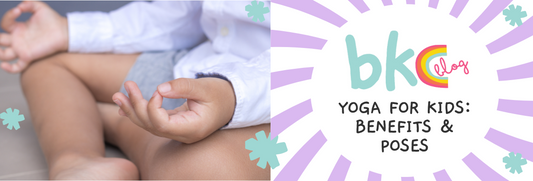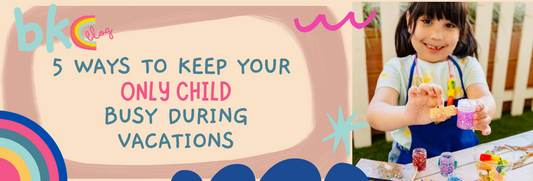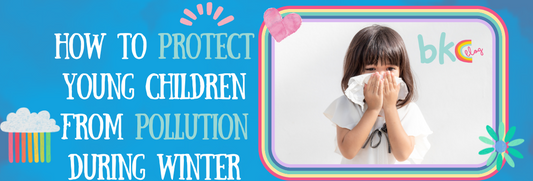Music makes the world go round, it is said. It can also be a powerful tool in aiding your child’s all-round development – physical, mental, emotional, and social capabilities included. Here’s how you can help your child begin their music appreciation and education journey.

Most of us connect to music in some capacity. It evokes a whole host of emotions, predominantly joy. Then there are those of us who share a deeper connection, whether by playing an instrument or through singing. Simply by way of existing, your child will be exposed to music, so why is it necessary for parents and teachers to put in effort to inculcate an appreciation of music in their children?
Well, because research shows that music aids child development. It promotes creative thinking, elevates anxiety, and helps interpersonal relationships. Studies show that musical interventions have the potential to better a child’s educational progress and thereby, influence their brain development.
Benefits of Learning Music
Let’s dive a little deeper into the benefits of music education, before we talk about how to develop an appreciation for it in your child.
1. Greater Language Learning Abilities

Children with basic music-related skills are able to develop better pre-literacy skills. Young children in particular benefit from this transfer of musical skills to smoother language acquisition. Research shows that the areas of the brain controlling musical ability and language comprehension are closely linked. Your child stands to develop a larger vocabulary, improved pronunciation, and better reading comprehension skills.
2. Better Focus and Memory
Whether it’s a child simply learning the lyrics and melody of their favourite songs for sing-alongs, or actively pursuing music education, music depends on memory. Learning the right notes to play or memorising how to recognise and read notes – all require a high level of memorisation, which in turn demands focus and concentration.
3. Improved Motor Skills

Music and movement go hand in hand. A child old enough to stand on their two feet reacts to music through some form of movement, usually swaying their hips, or tippy-tapping their feet. For children learning to play instruments, they’re challenged with complex hand-eye coordination, which develops their mental and physical dexterity.
4. Emotional Maturity and Social Bonding Skills
Engaging with music evokes some form of emotion. Music can help children express and process complex emotions, such as grief, jealousy, anger, vulnerability, and of course, love. Music has a crucial role to play in helping young children form connections with their peers. For children learning to play music as a collective, there’s also a strong aspect of teamwork, which gives children first-hand experience of coming together and finding solutions to work towards a common goal.

5. Determination, Discipline, and Rigour
As much as it brings joy, for those that seek to study music, it requires a great deal of patience and practice – qualities that are also necessary for doing well in academics. Research shows people who study music have a greater capacity for information processing and comprehension. It has also been shown to improve children’s abilities to grasp mathematical concepts. It improves problem solving skills and promotes creative thinking.
How to Help Your Child Take an Interest in Music
With the many benefits that music education and appreciation has to offer, you may be itching to enrol your child for lessons right away. But to make sure this is an enjoyable experience for your child, as it should be, it may be best to follow an age-appropriate progression up the scale. Here are a few activities that can help you set your child off on a music appreciation journey for life.
1. Sing Simple Songs to Infants & Toddlers
Age is no bar when it comes to music. Even babies have the ability to recognise and respond to melodies. Make up short songs or lullabies for your infant or toddler. These could be about activities they are engaging with, such as eating or bathing.

For toddlers starting to speak, encourage them to sing along with you. Make a show out of it by carrying out vocal exercises (aah, ooh, and other sounds) before you begin.
2. Explore Music Through Dance With Your Toddler
Here’s a great way to have your toddler expend their boundless energy and learn to enjoy music: dance! While singing their favourite songs and rhymes, start tapping or clapping with the song. Along with encouraging them to move, you would have introduced them to the basics of beat and tempo. Sandra Boynton’s Hog Wild!: A Frenzy of Dance Music, which comes with a songbook and a CD accompaniment, is perfect for this activity.

Toddlers love repetition so sing familiar songs while simply replacing the last word of a line with something silly. Invite them to join in. This will teach them new words, and how to speak them correctly. They will learn to recognise and repeat pitch, tone, and the proper way to enunciate words.
3. Make Musical Toys with Your Preschooler

So that you or your neighbours do not end up hating us for this idea, make sure you pick the right day for this. Once you’ve set aside a day for noise, go for it! Have an impromptu jamming session in your kitchen with non-breakable everyday items, such as spatulas, tongs, and steel plates and utensils. Try making DIY instruments with household items. For instance,
-
DIY shaker: Put moong dal in a plastic bottle and glue it shut.
-
DIY guitar: Take an empty tissue box with rubber bands of various sizes stretched over it, and you have a DIY guitar.
You could also get your child age-appropriate musical toys, such as a xylophone, drums, a mouth organ, maracas, or an egg shaker. Even a rudimentary introduction to musical instruments, such as a rattle, can be a meaningful first step.
4. Read Books Related to Music

There are quieter ways to appreciate music, too! Talk or read to your child about music. Read about music legends in the book Music Cats, and learn silly songs together with Rhinoceros Tap: 15 Seriously Silly Songs. Talk about different musical instruments and accessories while colouring this music-themed giant poster. Teach them about various composers with the help of the book Ah, Music! by Aliki.
5. Expose Your School-Age Child to Different Genres of Music
Once your child is about six or seven years old, they will start developing likes and dislikes regarding music. They may even enjoy having a folder of their favourite music to listen to. (Browse child-friendly headphones.)

At this age, most of the music your child will know will likely be from children’s movies or contemporary pop songs, which is why they will benefit greatly from being exposed to music from different genres and time periods. Play some songs by the Beatles, Etta James, and Elvis Presley, or show them videos of Ravi Shankar on the sitar and Zakir Hussain playing the tabla. While doing this, tell them something about these bands or musicians, what informed their music choices, their historical context, the instruments they played, and their chosen genre of music. Encourage them to find out more along the same lines about the contemporary artists they listen to.
6. Watch Documentaries & Movies About Music

Another excellent way to broaden your child’s knowledge of music is through musicals and documentaries. Try musicals like Happy Feet, Coco, The Sound of Music, The Greatest Showman, and The Music Man. Or watch movies such as School of Rock, August Rush, The Music Inside, and A Boy Called Sailboat. For documentaries you can dip your feet in with the limited series The Art of Violin, Music Changes Lives (about the transformative power of music), and The Girls in the Band (about female jazz musicians and the hardships they’ve faced).
7. Enjoy Karaoke Nights as a Family

And finally, what's not to love about a karaoke night to celebrate the joy of music and enjoy quality time as a family. We recommend kicking the night off with some basic vocal warm-ups. For young kids, it will challenge them on their reading skills, as well as their ability to stay in key and on beat; but they will probably be having so much fun that they won’t notice even when they mess up. Remember the idea is for your child to have a good time and build confidence with expressing themselves through music.
Eventually it would be wonderful if your child could be exposed to live performances – concerts and recitals – for a truly immersive experience.
The great thing about trying any or all of these activities with your child is there is nothing to lose, and everything to gain. Whether your child comes away knowing a little more than what they did earlier, a keen sense of tone and pitch, or an active interest in taking music lessons, it will be enough. You will have opened up new possibilities for them, and perhaps developed a renewed appreciation for music yourself!





